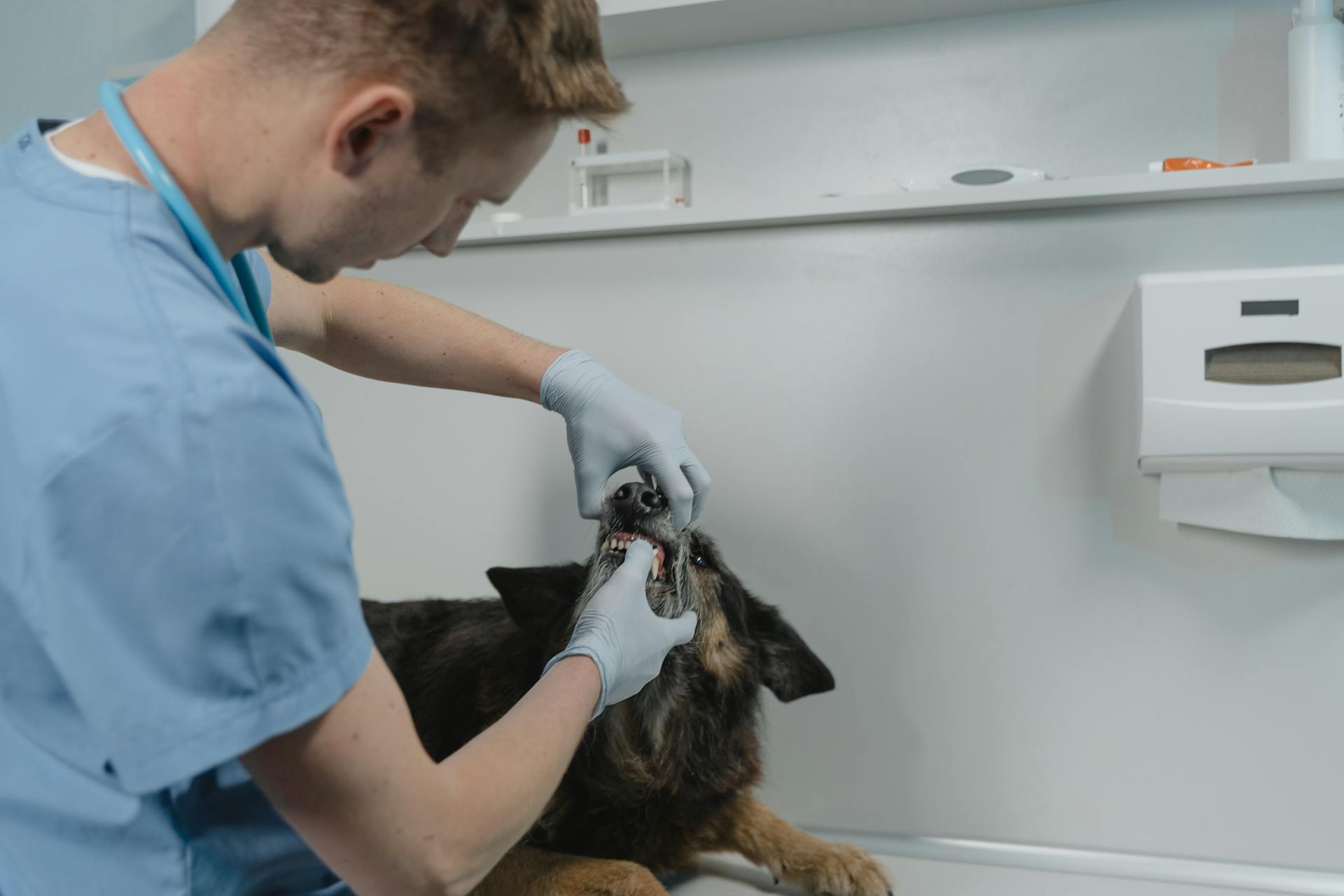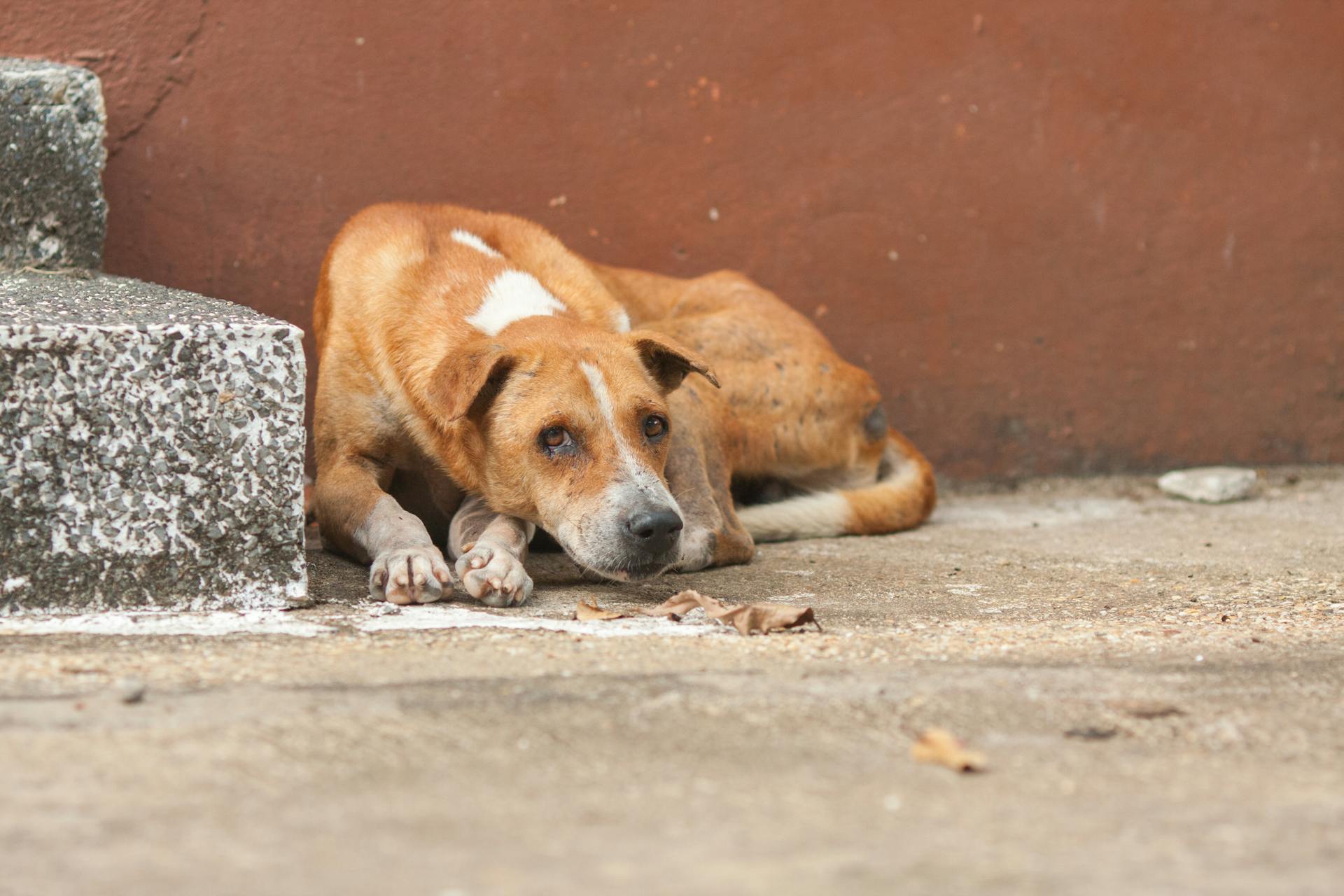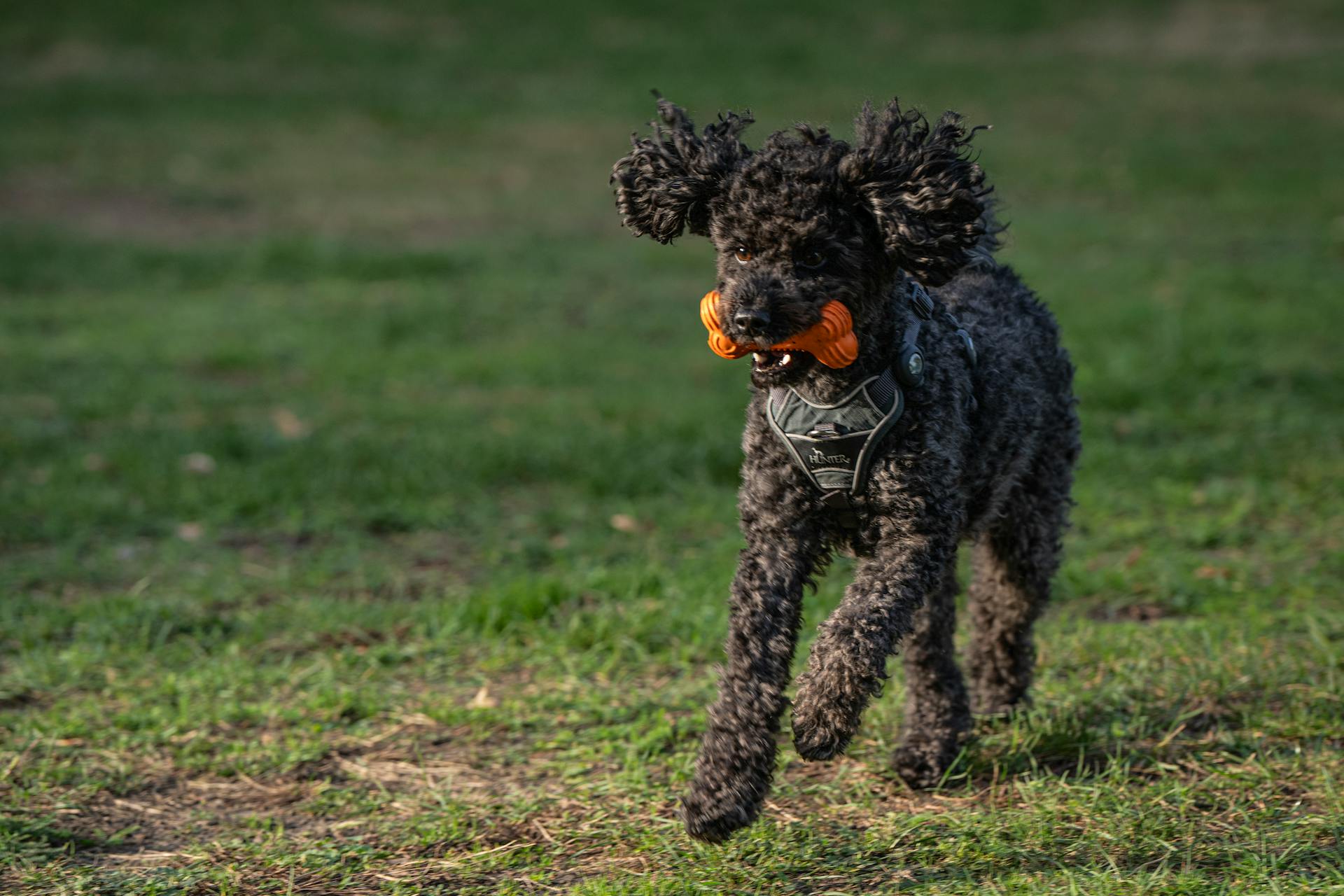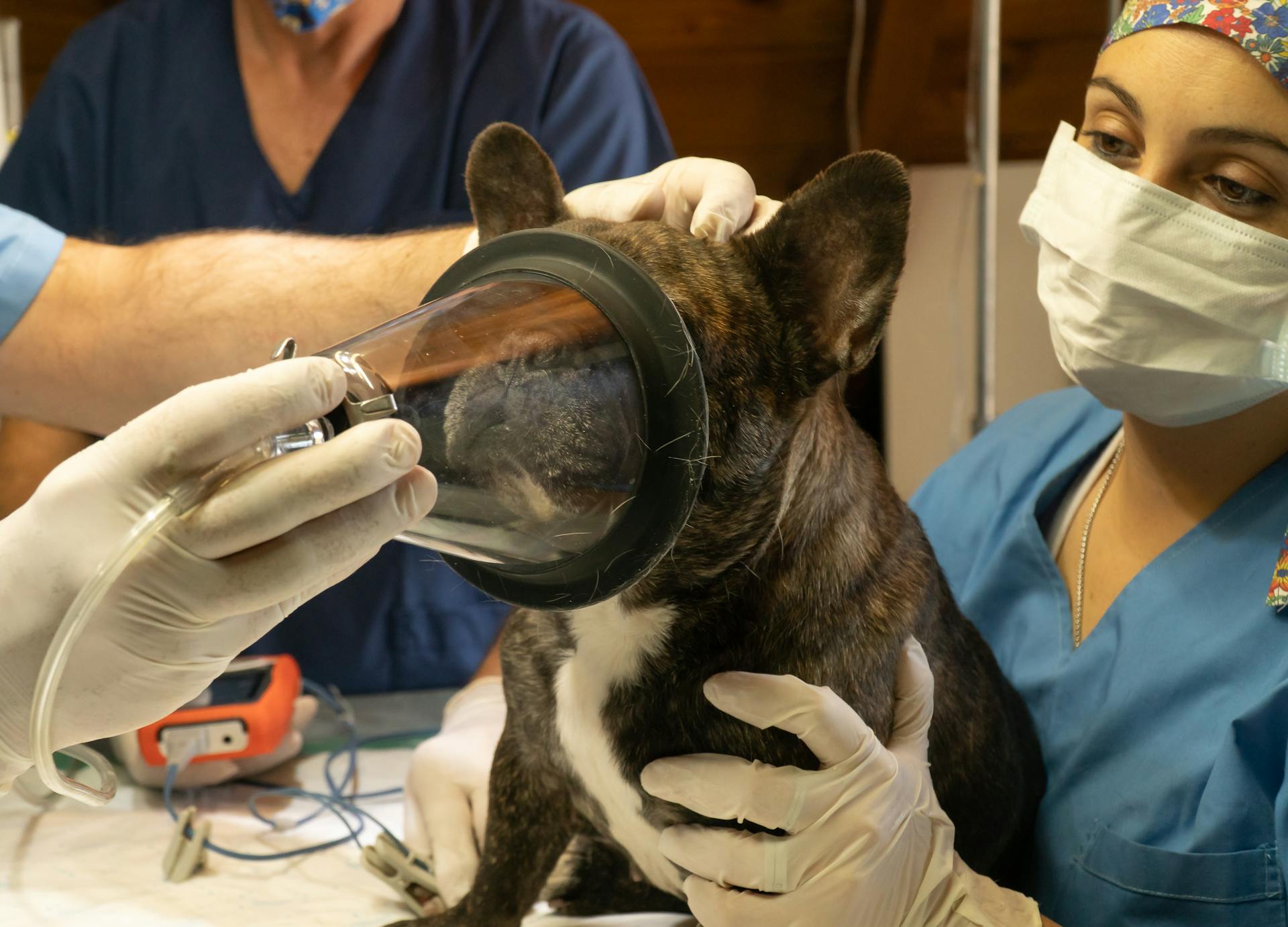
October is a special month for our furry friends, as it's recognized as Dog Dental Health Month. This awareness month highlights the importance of maintaining good oral health in dogs, which is often overlooked.
Regular brushing is key to preventing tartar buildup, which can lead to painful dental issues. Brush your dog's teeth at least 2-3 times a week, using a dog-specific toothbrush and toothpaste.
Just like humans, dogs can develop plaque, which can cause gum inflammation and even lead to heart problems. Brushing your dog's teeth regularly can help prevent this from happening.
Some dogs are more prone to dental issues than others, especially those with certain breeds or genetic predispositions. For example, small breeds like Chihuahuas and Poodles are more susceptible to tooth decay.
Professional dental care is also essential for maintaining your dog's oral health. Regular cleanings by a veterinarian can help remove tartar and plaque, and identify any potential issues early on.
Readers also liked: Veterinary Oral Health Council Dog
Causes of Pet Problems
Dental problems can be a real pain for our furry friends. Periodontal disease is the most common dental condition in dogs and cats, and by the time your pet is 3 years old, they'll likely have some early evidence of it.
It's essential to catch periodontal disease early, as it can lead to severe problems and pain for your pet. Advanced periodontal disease can also cause kidney, liver, and heart muscle changes.
Periodontal disease starts with plaque that hardens into tartar. You can see tartar above the gumline, but the plaque and tartar below the gumline are what cause the real damage.
Here's a breakdown of the common dental problems that can affect our pets:
- Broken teeth and roots
- Periodontal disease
- Abscesses or infected teeth
- Cysts or tumors in the mouth
- Malocclusion, or misalignment of the teeth and bite
- Broken (fractured) jaw
- Palate defects (such as cleft palate)
It's also worth noting that 8 out of 10 dogs will start showing signs of periodontal disease at a relatively young age. This is why regular dental checks and good oral health habits are crucial to keeping your pet's mouth happy and healthy.
At Home Care
Brushing your dog's teeth at home is one of the most effective ways to prevent plaque and tartar buildup, so make it a habit to brush their teeth daily or at least several times a week.
Start by introducing your dog to tooth brushing slowly and positively, using a soft, wet toothbrush and a pet-safe toothpaste that's available in flavors like poultry, beef, malt, and mint.
Human toothpaste contains ingredients that can cause internal problems if swallowed, so never use it for your dog. Also, avoid using baking soda to clean your dog's teeth, as it can upset their stomach and digestive tract.
Some pets may not tolerate brushing, so don't force it if they become irritated or aggressive. Instead, utilize products advocated by your veterinarian to help prevent plaque and tartar.
Table scraps can increase the speed at which plaque and tartar accumulate, so avoid giving them to your dog. Regular semi-annual wellness appointments with your vet are also essential for discussing your dog's dental health and taking further steps.
You can expect puppies to start sprouting their baby teeth between 3 and 8 weeks of age, and adult teeth start coming in around 3-6 months old.
Curious to learn more? Check out: Pitbull Dog 3 Months
Professional Care
Professional care is essential for maintaining your dog's dental health. A thorough dental cleaning is recommended to prevent problems that result in more extensive dental work.
Rough tartar accumulation on tooth surfaces and the gum line requires a professional oral assessment, treatment, and prevention visit. This visit includes a thorough dental examination, teeth cleaning, and polishing to remove tartar and invisible plaque.
Your veterinarian may perform pre-anesthetic blood tests to ensure your dog's kidney and liver function are satisfactory for anesthesia. An evaluation of the heart and abdomen may also be necessary.
For proper dental care, your dog will be placed under general anesthesia. Once under general anesthesia, your veterinarian and veterinary assistants will thoroughly examine the mouth, noting abnormalities in the medical record.
A dental probe will be used to evaluate gum bleeding and periodontal pockets where food can accumulate if not cared for. Tooth scaling will be performed, using both hand and ultrasonic scalers to remove tartar above and below the gum line.
The tartar below the gum line causes the most significant periodontal disease, so it's crucial that it be thoroughly removed. After scaling, the teeth are polished to remove microscopic scratches and decrease the rate of plaque build-up.
Additional reading: Homemade Food for Dogs with No Teeth
Oral Health
Regular dental check-ups are crucial for your dog's oral health. Your veterinarian should check your dog's teeth at least once a year for early signs of problems.
Bad breath, broken or loose teeth, extra teeth or retained baby teeth, teeth that are discolored or covered in tartar, abnormal chewing, drooling, or dropping food from the mouth, reduced appetite or refusal to eat, pain in or around the mouth, bleeding from the mouth, and swelling in the areas surrounding the mouth are all signs that your dog needs a dental check-up.
Prevention of common oral disease in pets consists of frequent removal of dental plaque and tartar that forms on teeth that are not kept clean. Regular brushing is the single most effective thing you can do to keep your dog's teeth healthy between dental cleanings.
Here are some signs of periodontal disease in dogs:
- Breed: Purebreds, small dogs, and pets with short muzzles are prone to overcrowding and rotation of teeth, as well as misalignment.
- Age: The older the pet, the longer dental disease has to accumulate.
- Immune system health: A healthy immune system contributes to a healthy mouth.
Nutrition can contribute to preventing periodontal disease and gingivitis. Dental food kibbles are built differently from conventional kibbles, forcing the animal to actually chew them and swiping the plaque from the tooth as the pet bites through them.
Regular brushing is the most effective prevention against dental disease, and it's essential to get your dog accustomed to having their mouth handled by humans from an early age. Brush your dog's teeth as often as possible, and use a pet-safe toothpaste.
Here are some at-home dental care products you can use if you're unable to brush your dog's teeth:
- Water additives
- Treats packed with plaque-fighting enzymes
- Special pet toothpaste
Remember, regular dental cleanings are crucial for your dog's oral health, and it's essential to follow your veterinarian's recommendations for care.
Why Dentistry Requires Anesthesia
Dentistry requires anesthesia because your pet doesn't understand the benefit of dental procedures, so they react by moving, trying to escape, or even biting.
Anesthesia makes it possible to perform dental procedures with less stress and pain for your pet. This is especially important for radiographs, or x-rays, which require your pet to be very still to get good images.
Your pet might seem a little groggy for the rest of the day after anesthesia, but most pets can go home the same day of the procedure. This is a relief for many pet owners.
Anesthesia allows for a better cleaning because your pet is not moving around and risking injury from the dental equipment. This is a crucial aspect of pet dental health.
Curious to learn more? Check out: How Much Food Should a Havanese Eat per Day
Good Pet Care
Good pet care is crucial for maintaining your dog's overall health, and that starts with their dental health. Regular dental cleanings can add years to your dog's life, and it's essential to include dental hygiene in their health and wellness routine.
You can start by checking your dog's teeth and gums regularly, ideally daily, to monitor for signs of trouble. If you notice red, irritated gums or dark staining on the teeth, it's time for a dental check with your vet.
Puppies and kittens usually start to sprout their baby teeth between 3 and 8 weeks of age, and you can expect adult teeth to start coming in around 3-6 months of age. There are 28 deciduous teeth in puppies and 26 in kittens.
Brushing your dog's teeth is the single most effective thing you can do to keep their teeth healthy between dental cleanings. Daily brushing is best, but brushing several times a week can be effective, especially with patience and training.
Good oral health and hygiene starts at home, and regular dental care can help prevent periodontal disease, which is the number one illness found in both dogs and cats.
Suggestion: How to Start Raw Food Diet for Dogs
Sources
- https://shallowfordvet.com/february-national-pet-dental-health-month-know/
- https://www.banfield.com/en/Bblog/bwell/2023/National-Pet-Dental-Health-Month
- https://www.lincolnshireanimalhospital.com/blog/pet-dental-month-facts-did-you-know/
- https://www.amcny.org/2024-pet-holidays-and-veterinary-awareness-days/pet-dental-health-month-2024/
- https://happytailsvetnj.com/february-is-national-pet-dental-health-month/
Featured Images: pexels.com


